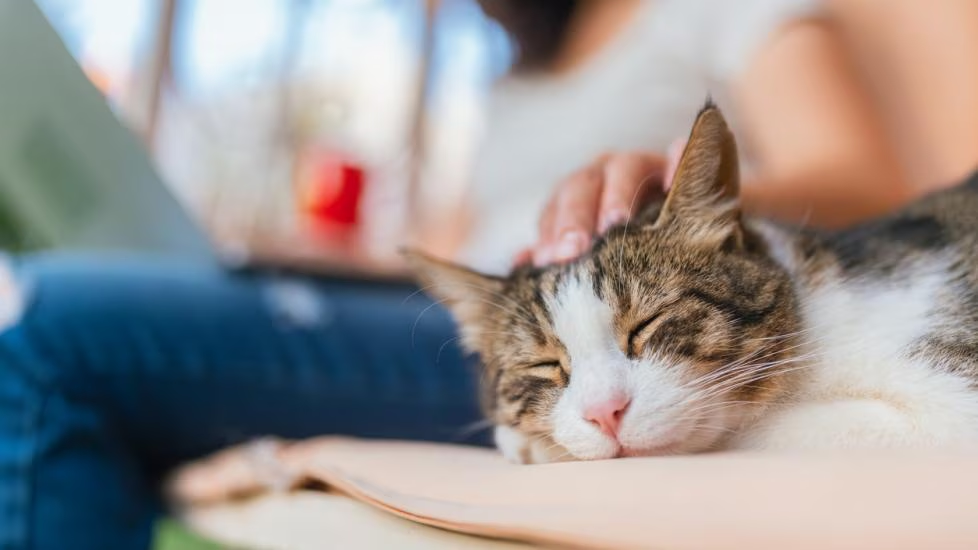Chronic vomiting in cats is a common yet concerning issue that pet owners often encounter. While occasional vomiting may not be alarming, frequent or persistent vomiting is a sign that something may be wrong with your cat’s health. Chronic vomiting can be caused by a variety of factors, ranging from dietary issues to more serious underlying conditions. Understanding the causes, recognizing the symptoms, and knowing the available treatment options is essential to ensuring your cat’s well-being.
What is Chronic Vomiting in Cats?
Chronic vomiting in cats refers to vomiting that occurs repeatedly over an extended period. While occasional vomiting in cats can be normal—especially in the case of hairballs or minor stomach irritations—when vomiting becomes frequent (occurring more than once a week), it may indicate an underlying health problem that requires attention.
The vomiting can range from small amounts of food or bile to larger, more forceful expulsions. It can be associated with a variety of symptoms, including loss of appetite, lethargy, weight loss, and diarrhea. If your cat experiences chronic vomiting, it is important to consult a veterinarian for a thorough evaluation.
Common Causes of Chronic Vomiting in Cats
Several different conditions can cause chronic vomiting in cats. Some of the most common causes include:
- Hairballs
- Hairballs are one of the most frequent causes of vomiting in cats, particularly in long-haired breeds. Cats groom themselves by licking their fur, and this can result in hair accumulating in their stomachs. While hairballs are generally a normal occurrence, frequent or severe hairballs can lead to vomiting, particularly if the hair becomes difficult to pass. Cats with excessive hairballs may need assistance through regular grooming or specialized diets designed to help eliminate hairballs.
- Food Sensitivities and Allergies
- Cats can develop sensitivities or allergies to certain ingredients in their food. Common culprits include dairy, gluten, or certain proteins. These allergies can lead to gastrointestinal distress, resulting in vomiting, diarrhea, and other digestive issues. If food allergies are suspected, your veterinarian may recommend a special hypoallergenic diet or an elimination trial to identify the offending ingredient.
- Infections
- Various bacterial, viral, or parasitic infections can affect your cat’s gastrointestinal system, leading to vomiting. Feline parvovirus, for example, can cause severe vomiting and diarrhea, while bacterial infections such as Salmonella or E. coli may also contribute to chronic vomiting. In addition, parasitic infections caused by worms like roundworms or hookworms can cause gastrointestinal upset.
- Inflammatory Bowel Disease (IBD)
- IBD is a condition where the gastrointestinal tract becomes inflamed, often leading to chronic vomiting. IBD can be caused by various factors, including food allergies, parasites, and infections. In some cases, IBD is idiopathic, meaning the exact cause is unknown. Cats with IBD may also experience diarrhea, weight loss, and a decrease in appetite.
- Gastrointestinal Obstructions
- A gastrointestinal obstruction occurs when something, such as a foreign object, food, or hair, gets stuck in the cat’s digestive system. This can cause vomiting as the body tries to expel the obstruction. Cats who chew on non-food objects, such as plastic or string, are at a higher risk of gastrointestinal obstructions. If your cat has been vomiting for an extended period and also exhibits signs of pain or discomfort, it’s important to have a veterinarian investigate for possible blockages.
- Hyperthyroidism
- Hyperthyroidism is a condition commonly found in older cats. It occurs when the thyroid gland becomes overactive and produces too much thyroid hormone. This can lead to a variety of symptoms, including weight loss, increased appetite, increased thirst, and chronic vomiting. Hyperthyroidism is treatable, and treatment options may include medication, surgery, or radioactive iodine therapy.
- Kidney Disease
- Chronic kidney disease (CKD) is another common cause of vomiting in older cats. As the kidneys become less effective at filtering waste products from the body, toxins build up, leading to nausea and vomiting. In addition to vomiting, CKD can cause lethargy, weight loss, and increased thirst. Early diagnosis and management are key to slowing the progression of kidney disease and improving the cat’s quality of life.
- Pancreatitis
- Pancreatitis is an inflammation of the pancreas, an organ responsible for producing digestive enzymes. When the pancreas becomes inflamed, it can result in nausea, vomiting, abdominal pain, and a lack of appetite. Pancreatitis in cats can be caused by factors such as obesity, infections, or trauma. It often requires prompt veterinary care to manage symptoms and address the underlying causes.
- Cancer
- Cancer, particularly gastrointestinal cancer, can cause chronic vomiting in cats. Tumors in the stomach, intestines, or other parts of the digestive tract can disrupt normal digestion, leading to vomiting. In cases where cancer is suspected, diagnostic imaging such as X-rays or ultrasounds may be necessary, along with biopsy and histopathology to confirm the diagnosis.
Symptoms to Watch For
In addition to vomiting, there are several other symptoms that may accompany chronic vomiting in cats:
- Loss of Appetite: A cat that vomits frequently may begin to lose interest in food or eat less than usual.
- Weight Loss: Persistent vomiting can lead to weight loss due to the cat’s inability to retain nutrients.
- Diarrhea or Constipation: Vomiting is often associated with other gastrointestinal issues such as diarrhea or constipation.
- Lethargy: Chronic vomiting can leave a cat feeling tired, weak, and unwilling to play or engage in normal activities.
- Dehydration: Frequent vomiting can cause dehydration, leading to dry gums, sunken eyes, and excessive thirst.
Diagnosis of Chronic Vomiting
If your cat is vomiting frequently, it is important to take them to the vet for a thorough evaluation. The vet will take a detailed history, perform a physical examination, and may recommend diagnostic tests such as:
- Blood Tests: To check for underlying issues such as kidney disease, hyperthyroidism, or infections.
- Fecal Tests: To detect parasites or infections in the gastrointestinal tract.
- Ultrasound or X-rays: To look for foreign objects, tumors, or other obstructions in the abdomen.
- Endoscopy or Biopsy: In some cases, a vet may recommend an endoscopic examination or biopsy to take a closer look at the gastrointestinal tract and obtain tissue samples.
Treatment Options for Chronic Vomiting
The treatment for chronic vomiting in cats depends on the underlying cause. Some treatment options may include:
- Dietary Changes: If food allergies or sensitivities are the cause, your vet may recommend a special hypoallergenic or easily digestible diet.
- Medication: Depending on the condition, medications such as anti-nausea drugs, antibiotics, anti-inflammatory drugs, or thyroid medication may be prescribed.
- Surgery: In cases of gastrointestinal obstructions or tumors, surgery may be necessary to remove the obstruction or affected tissue.
- Fluids and Nutritional Support: Cats that are dehydrated or underweight due to chronic vomiting may need intravenous fluids and nutritional support.
- Management of Underlying Diseases: Treating underlying conditions such as hyperthyroidism, kidney disease, or pancreatitis is essential to resolving chronic vomiting.
Prevention and Management
While it may not always be possible to prevent chronic vomiting in cats, there are several steps you can take to reduce the risk:
- Proper Diet: Feed your cat a balanced and appropriate diet, avoiding sudden changes or feeding harmful foods.
- Regular Vet Visits: Routine veterinary check-ups can help catch any underlying conditions early.
- Monitor Behavior: Watch for signs of vomiting, loss of appetite, or changes in behavior and consult your vet promptly.
- Avoid Foreign Objects: Keep non-food items, such as string, rubber bands, and plastic, away from your cat to prevent gastrointestinal obstructions.
Conclusion
Chronic vomiting in cats is a serious issue that should not be ignored. While it can be caused by a variety of factors, including food sensitivities, infections, and underlying health conditions, prompt veterinary care can help identify the cause and provide effective treatment. With the right care and management, most cats can recover and lead a healthy, happy life. If your cat is experiencing chronic vomiting, it is essential to seek professional veterinary advice to ensure the best possible outcome for your feline companion.

